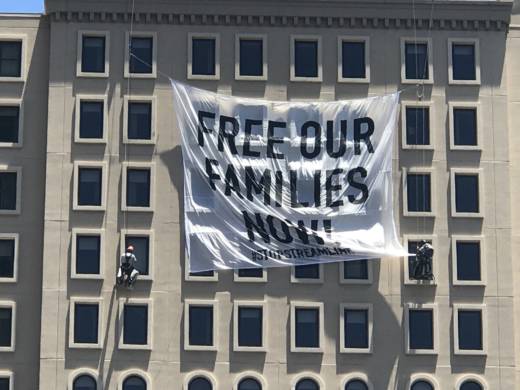Federal Judge Dana Sabraw ordered the U.S. government on June 26 to halt the family separations and reunite children with their parents, with a two-week deadline for children under 5.
The agencies said that as of early Thursday morning, 57 of the originally identified children younger than 5 have been reunited with their parents, plus an additional, recently discovered child added to the group.
On a media call, government officials said the other 46 children in the under-5 group could not be reunited with parents by the court-ordered deadline for various reasons.
Those include recent determinations about a parent’s criminal background, an inability to verify parents’ links to the children and a dozen people who were deported while their children remain in the U.S., according to a filing in the San Diego-based federal case Thursday afternoon.
“With regard to those children whose parents are removed, Defendants are working with Plaintiffs’ counsel to locate those parents and to provide them notice to determine if they wish to be reunified with their children,” the filing says. “It is difficult to determine how much time will be necessary for those reunification[s] until parents are contacted and it can be determined what those reunifications would entail.”
ICE Executive Associate Director of Enforcement and Removal Operations Matthew Albence took a harsher stance than the government’s filing during a Thursday morning conference call with reporters.
“We’re under no obligation to bring people who have no lawful status in this country back into this country for reunification,” he said. “These individuals had the opportunity to bring that child with them when they were removed in the first place.”
He added: “They paid the smuggling fees, they paid the traffickers and they paid the coyotes the money to get to this country to get their child here. They’re not going to generally take that child back with them after they’ve accomplished their smuggling.”
The plaintiffs, led by the ACLU, said in the joint filing that they have not received specific information about most of the people the government asserts are ineligible for reunification. And they can’t verify the government’s claim that 58 children are, indeed, back with their parents.
Leading up to the court’s Tuesday deadline to reunify all separated children younger than 5, “Defendants claimed that they would provide Plaintiffs’ counsel with notice of the time and place for each reunification, so that Plaintiffs’ counsel could arrange for private and NGO service providers to assist the families and verify reunification,” the plaintiffs wrote.
“This did not happen,” the filing continues. “Defendants did not provide specific time and place information for a single Class Member.”
The lack of communication, the ACLU attorneys say, led to “significant problems” during the scramble to meet the court’s deadline.
Those include a parent stranded alone with her 6-month-old at a bus stop, another parent shuffled around ICE facilities in New Jersey and Michigan for days and separated from his lawyer, and a mother who waited most of the day to be reunified with her children and released with an electronic ankle monitor, only to be sent back to detention alone.
Parents are also being told they have to pay to be reunited with their children, according to the ACLU, including one parent who was told to wire $1,900 and another who was initially told to purchase a plane ticket.
“It is not acceptable for Defendants to make compliance with this Court’s injunction contingent on Class Members paying thousands of dollars to reunify with their children,” the filing says.
Despite representations that the government is now in compliance with the court’s order, plaintiffs assert that they missed the Tuesday deadline for approximately 20 children. To avoid further delays as the parties turn their attention to reuniting far more separated children 5 and older with their parents by July 26, the ACLU is asking the court to force the government to provide more details, faster, and to establish a fund to pay for counseling for the children.
“Although many medical professionals have graciously offered pro bono services for the children, who plainly are in desperate need of counseling, these medical professionals should not have to assume the costs associated with the government’s policy,” the filing says.
The government says it will provide a list of parents and children eligible for reunification by Friday, but asserts that the level of detail the plaintiffs are requesting could take “a significant amount of time on the part of operators whose time would be better spent facilitating reunification.”

